#Robert Roosevelt
Text
Summer Schedule
You will have seen my earlier post about Wilde’s lecture in Narragansett Pier.
Perhaps we should place that visit into the wider context of Wilde’s Summer schedule of 1882 and his yearlong lecture tour of North America.
Continue reading Untitled
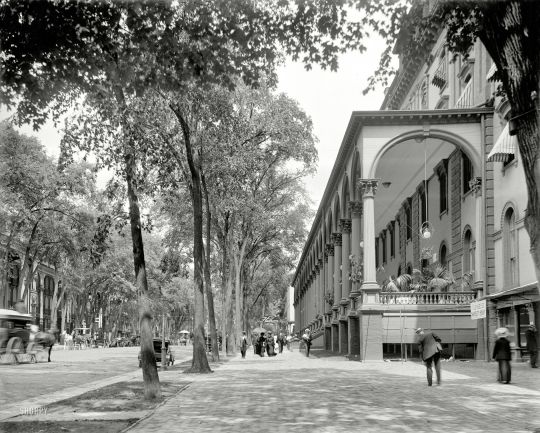
View On WordPress
#oscarwilde#Clara Morris#Fire Island#Hearts-Ease#Henry Ward Beecher#long beach#Long Branch#Peekskill#Riverdale#Robert Roosevelt#Summer 1882#Ulysses S. Grant
0 notes
Text
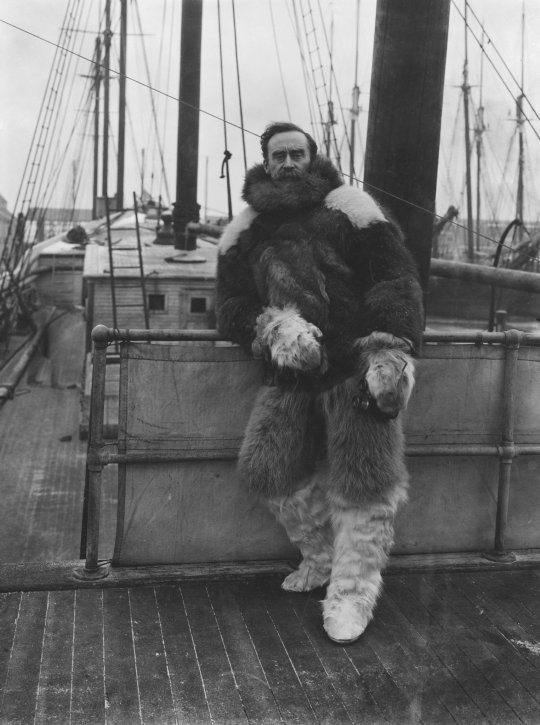
207 notes
·
View notes
Text
I'M AMERICAN. AMERIKANSKI. ROOSEVELT. STALIN. COCA-COLA.
#rosie rosenthal#robert rosenthal#masters of the air#mota#hbo war#IM AMERICAN AMERIKANSKI ROOSEVELT STALIN COCA COLA
89 notes
·
View notes
Text

Les couleurs de la ville.
Mur
#photographie urbaine#urban photography#couleurs urbaines#urban colors#décor urbain#urban decor#abstraction#figuration#mur#wall#minimalisme#minimalism#rue robert#saxe roosevelt#69006#lyon#rhône#auvergne rhône alpes#france#photographers on tumblr#poltredlyon#osezlesgaleries#monlyon#onlylyon#igerslyon#lyonurb
102 notes
·
View notes
Text
Out Representative-elect Robert Garcia (D-CA) may not have been able to get sworn in yesterday due to Republicans’ inability to elect a Speaker of the House, but he has plans for when he finally can be sworn in.
When he takes his oath of office, he’ll swear on a copy of the Constitution, and, beneath that, an original Superman #1 comic from 1939, a photo of his parents, and a copy of his citizenship certificate.
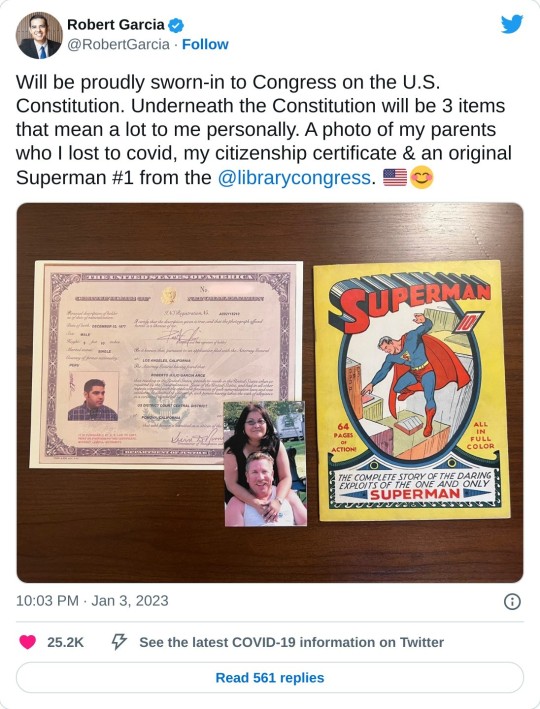
Garcia came to the U.S. from Peru with his family when he was five-years-old and has said that naturalization was “his proudest moment” and the reason he started a career in politics. His parents died in 2020 of COVID-19.
He was the youngest and first out LGBTQ+ person elected as mayor of Long Beach, California (a position he served in from 2014 to 2022). During his time as mayor, he worked with businesses to reduce their environmental impacts, filled vacancies on citizen commissions with diverse and female members, and worked to improve local infrastructure as well as financial opportunities for local artists and home-based business owners.
He’s also an avid comic book fan.
In November, he tweeted a photo of the Superman #1 comic along with Amazing Fantasy #15, in which Spider-Man first appeared, saying he didn’t know which one he would first check out from the Library of Congress.
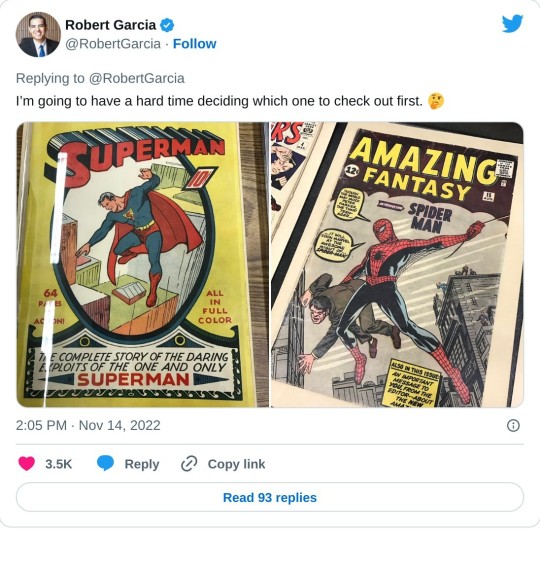
While many members of Congress will be sworn in on Bibles, they are not legally required to do so. Former Rep. – and current Minnesota attorney general – Keith Ellison (D-MN), who was the first Muslim person elected to Congress in 2007, was sworn in on a copy of the Quran owned by Thomas Jefferson.
Theodore Roosevelt wasn’t sworn in with any object after the assassination of William McKinley in 1901. And in 2014 Suzi LeVine was sworn in as U.S. ambassador to Switzerland and Liechtenstein on a Kindle with a copy of the Constitution open.
“I wanted to use a copy that is from the twenty-first century and that reflects my passion for technology and my hope for the future,” she said at the time.
New members of the House can’t be sworn in until a speaker is elected. Yesterday, after three votes, no candidate for Speaker was able to get a majority of votes because of a faction of Republicans voting against Rep. Kevin McCarthy (R-CA). The Democrats’ candidate – Rep. Hakeem Jeffries (D-NY) – got the most votes in each round of voting, and around 20 Republicans – including anti-LGBTQ+ Reps. Paul Gosar (R-AZ), Lauren Boebert (R-CO), Bob Good (R-VA), and Matt Gaetz (R-FL) – voted for Rep. Jim Jordan (R-OH).
Jordan himself nominated and voted for McCarthy.
The House adjourned without a new Speaker elected.
#us politics#news#2023#twitter#tweet#Democrats#lgbtq nation#robert garcia#us house of representatives#118th congress#detective comics#us constitution#library of congress#lgbtqia+#lgbtqia+ representation#lgbtqia+ pride#us history#President Theodore Roosevelt#Suzi LeVine#Keith Ellison#superman#California
512 notes
·
View notes
Text

Defenders of the short-sighted men who in their greed and selfishness will, if permitted, rob our country of half its charm by their reckless extermination of all useful and beautiful wild things sometimes seek to champion them by saying the 'the game belongs to the people.' So it does; and not merely to the people now alive, but to the unborn people. The 'greatest good for the greatest number' applies to the number within the womb of time, compared to which those now alive form but an insignificant fraction. Our duty to the whole, including the unborn generations, bids us restrain an unprincipled present-day minority from wasting the heritage of these unborn generations. The movement for the conservation of wild life and the larger movement for the conservation of all our natural resources are essentially democratic in spirit, purpose, and method.
—Theodore Roosevelt, A Book-Lover's Holidays in the Open (1916)
[Robert Scott Horton
29 notes
·
View notes
Text
FILM STILLS: THE MAIN CAST OF THE ALIENIST
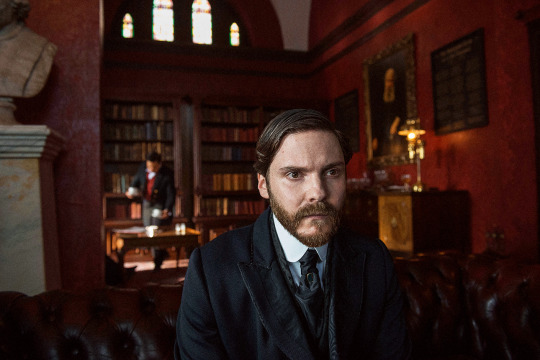
Daniel Brühl as Dr. Laszlo Kreizler

Dakota Fanning as Sara Howard

Luke Evans as John Schuyler Moore

Q'orianka Kilcher as Mary Palmer
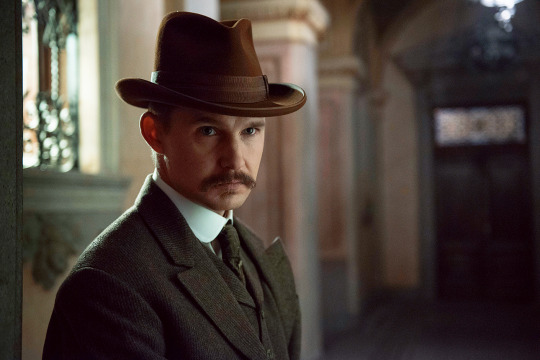
Brian Geraghty as Theodore Roosevelt

Douglas Smith as Marcus Isaacson

Matthew Shear as Lucius Isaacson
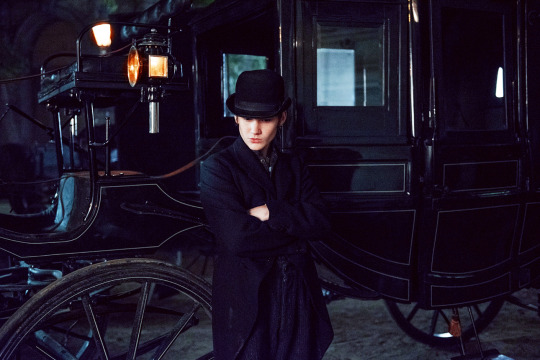
Matt Lintz as Stevie Taggert
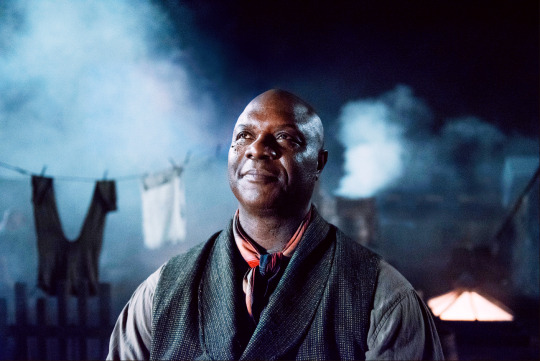
Robert Ray Wisdom as Cyrus Montrose
#the alienist#cast#photos#film stills#daniel brühl#laszlo kreizler#sara howard#dakota fanning#john moore#luke evans#Q'orianka Kilcher#Mary Palmer#Brian Geraghty#Theodore Roosevelt#Cyrus Montrose#Robert Ray Wisdom#Douglas Smith#Marcus Isaacson#Matthew Shear#Lucius Isaacson#Matt Lintz#Stevie Taggert#caleb carr#tv show#my edits
9 notes
·
View notes
Text
Why Robert Oppenheimer's Atomic Bomb Still Haunts Us
— By Richard Rhodes | Published May 15, 2013
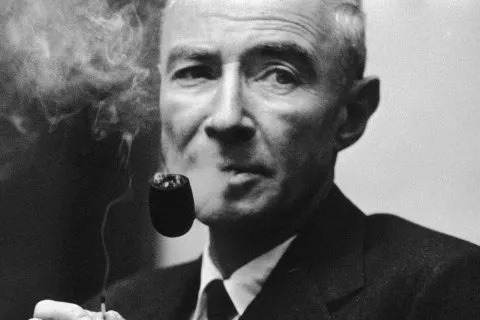
Oppenheimer spearheaded the creation of the atom bomb. René Burri/Magnum
Robert Oppenheimer oversaw the design and construction of the first atomic bombs. The American theoretical physicist wasn't the only one involved—more than 130,000 people contributed their skills to the World War II Manhattan Project, from construction workers to explosives experts to Soviet spies—but his name survives uniquely in popular memory as the names of the other participants fade. British philosopher Ray Monk's lengthy new biography of the man is only the most recent of several to appear, and Oppenheimer wins significant assessment in every history of the Manhattan Project, including my own. Why this one man should have come to stand for the whole huge business, then, is the essential question any biographer must answer.
It's not as if the bomb program were bereft of men of distinction. Gen. Leslie Groves built the Pentagon and thousands of other U.S. military installations before leading the entire Manhattan Project to success in record time. Hans Bethe discovered the sequence of thermonuclear reactions that fire the stars. Leo Szilard and Enrico Fermi invented the nuclear reactor. John von Neumann conceived the stored-program digital computer. Edward Teller and Stanislaw Ulam co-invented the hydrogen bomb. Luis Alvarez devised a whole new technology for detonating explosives to make the Fat Man bomb work, and later, with his son, Walter, proved that an Earth-impacting asteroid killed off the dinosaurs. The list goes on. What was so special about Oppenheimer?
He was brilliant, rich, handsome, charismatic. Women adored him. As a young professor at Berkeley and Caltech in the 1930s, he broke the European monopoly on theoretical physics, contributing significantly to making America a physics powerhouse that continues to win a freight of Nobel Prizes. Despite never having directed any organization before, he led the Los Alamos bomb laboratory with such skill that even his worst enemy, Edward Teller, told me once that Oppenheimer was the best lab director he'd ever known. After the war he led the group of scientists who guided American nuclear policy, the General Advisory Committee to the U.S. Atomic Energy Commission (AEC). He finished out his life as director of the prestigious Institute for Advanced Study in Princeton, New Jersey, where he welcomed young scientists and scholars into that traditionally aloof club.
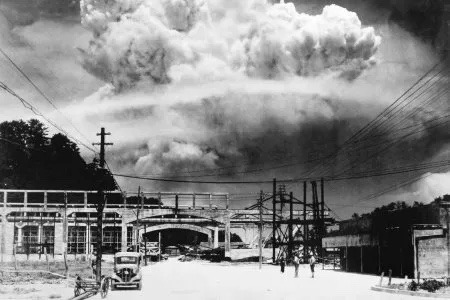
August 9, 1945: Nagasaki is hit by an atom bomb. Nagasaki Atomic Bomb Museum/EPA
Those were exceptional achievements, but they don't by themselves explain his unique place in nuclear history. For that, add in the dark side. His brilliance came with a casual cruelty, born certainly of insecurity, which lashed out with invective against anyone who said anything he considered stupid; even the brilliant Bethe wasn't exempt. His relationships with the significant women in his life were destructive: his first deep love, Jean Tatlock, the daughter of a Berkeley professor, was a suicide; his wife, Kitty, a lifelong alcoholic. His daughter committed suicide; his son continues to live an isolated life.
His Choices or Mistakes, Combined with his Penchant for Humiliating Lesser Men, Eventually Destroyed Him.
Oppenheimer's achievements as a theoretical physicist never reached the level his brilliance seemed to promise; the reason, his student and later Nobel laureate Julian Schwinger judged, was that he "very much insisted on displaying that he was on top of everything"—a polite way of saying Oppenheimer was glib. The physicist Isidor Rabi, a Nobel laureate colleague whom Oppenheimer deeply respected, thought he attributed too much mystery to the workings of nature. Monk notes his curiously uncritical respect for the received wisdom of his field.
Monk's discussion of Oppenheimer's work in physics is one of his book's great contributions to the saga, an area of the man's life that previous biographies have neglected. In the late 1920s Oppenheimer first worked out the physics of what came to be called black holes, those collapsing giant stars that pull even light in behind them as they shrink to solar-system or even planetary size. Some have speculated Oppenheimer might have won a Nobel for that work had he lived to see the first black hole identified in 1971.
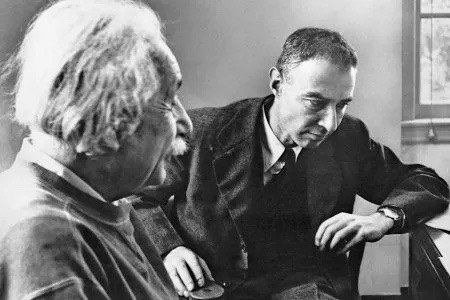
Oppenheimer with Albert Einstein, circa the 1940s. Corbis
Oppenheimer's patriotism should have been evident to even the most obtuse government critic. He gave up his beloved physics, after all, not to mention any vestige of personal privacy, to help make his country invulnerable with atomic bombs. Yet he risked his work and reputation by dabbling in left-wing and communist politics before the war and lying to security officers during the war about a solicitation to espionage he received. His choices or mistakes, combined with his penchant for humiliating lesser men, eventually destroyed him.
One of those lesser men, a vicious piece of work named Lewis Strauss, a former shoe salesman turned Wall Street financier and physicist manqué, was the vehicle of Oppenheimer's destruction. When President Eisenhower appointed Strauss to the chairmanship of the AEC in the summer of 1953, Strauss pieced together a case against Oppenheimer. He was still splenetic from an extended Oppenheimer drubbing delivered during a congressional hearing all the way back in 1948, and he believed the physicist was a Soviet spy.
Strauss proceeded to revoke Oppenheimer's security clearance, effectively shutting him out of government. Oppenheimer could have accepted his fate and returned to an academic life filled with honors; he was due to be dropped as an AEC consultant anyway. He chose instead to fight the charges. Strauss found a brutal prosecuting attorney to question the scientist, bugged his communications with his attorney, and stalled giving the attorney the clearances he needed to vet the charges. The transcript of the hearing In the Matter of J. Robert Oppenheimer is one of the great, dark documents of the early atomic age, almost Shakespearean in its craven parade of hostile witnesses through the government star chamber, with the victim himself, catatonic with shame, sunken on a couch incessantly smoking the cigarettes that would kill him with throat cancer at 63 in 1967.
Rabi was one of the few witnesses who stood up for his friend, finally challenging the hearing board in exasperation, "We have an A-bomb and a whole series of it [because of Oppenheimer's work], and what more do you want, mermaids?" What Strauss and others, particularly Edward Teller, wanted was Oppenheimer's head on a platter, and they got it. The public humiliation, which he called "my train wreck," destroyed him. Those who knew him best have told me sadly that he was never the same again.
For Monk as for Rabi, Oppenheimer's central problem was his hollow core, his false sense of self, which Rabi with characteristic wit framed as an inability to decide whether he wanted to be president of the Knights of Columbus or B'nai B'rith. The German Jews who were Oppenheimer's 19th-century forebears had worked hard at assimilation—that is, at denying their religious heritage. Oppenheimer's parents submerged that heritage further in New York's ethical-culture movement that salvaged the humanism of Judaism while scrapping the supernatural overburden. Oppenheimer, actor that he was, could fit himself to almost any role, but turned either abject or imperious when threatened. He was a great lab director at Los Alamos because of his intelligence—"He was much smarter than the rest of us," Bethe told me—because of his broad knowledge and culture; because of his psychological insight into the complicated personalities of the gifted men assembled there to work on the bomb; most of all because he decided to play that role, as a patriotic citizen, and played it superbly.
Monk is a levelheaded and congenial guide to Oppenheimer's life, his biography certainly the best that has yet come along. But he devotes far too many pages to Oppenheimer's Depression-era flirtation with communism, a dead letter long ago and one that speaks more of a rich esthete's awakening to the suffering in the world than to Oppenheimer's political convictions. He doesn't always get the science right. Most of the errors are trivial, but a few are important to the story.
Their Fundamental Objection Was to Giving up Production of Real Weapons so That Teller Could Pursue His Pipe Dream, a Dead-end Hydrogen Bomb Design.
A fundamental reason Oppenheimer opposed a crash program to develop the hydrogen bomb in response to the first Soviet atomic-bomb test in 1949 was the requirement of Edward Teller's "Super" design for large amounts of a rare isotope of hydrogen, tritium. Tritium is bred by irradiating lithium in a nuclear reactor, but the slugs of lithium take up space that would otherwise be devoted to breeding plutonium. To make tritium for a hydrogen bomb that the U.S. did not know how to build would have required sacrificing most of the U.S. production of plutonium for devastating atomic bombs the U.S. did know how to build. To Oppenheimer and the other scientists on the GAC, such an irresponsible substitution as an answer to the Soviet bomb made no strategic sense. It's true that the hydrogen bomb with its potentially unlimited scale of destruction made no military sense to them either—and was morally repugnant to some of them as well. But their fundamental objection, which Monk overlooks, was to giving up production of real weapons so that Teller could pursue his pipe dream, a dead-end hydrogen bomb design that never worked.
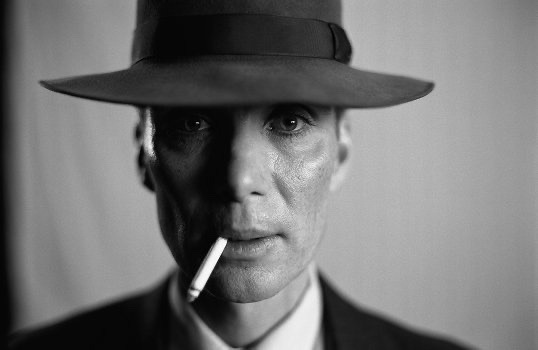
Julius Robert Oppenheimer (April 22, 1904 – February 18, 1967)
More egregious is Monk's notion that the Danish physicist Niels Bohr, Oppenheimer's mentor during the war on the international implications of the new technology, pushed for the bomb's use on Japan to make its terror manifest. He did not. He pushed, to the contrary, for the Allies, the Soviet Union included, to discuss the implications of the bomb prior to its use and to devise a framework for controlling it. Bohr foresaw that the bomb would stalemate major war, as it has, but correctly feared that U.S. secrecy about its development would lead to a U.S.-Soviet arms race. He conferred with both Roosevelt and Churchill about presenting the fact of the bomb to the Russians as a common danger to the world, like a new epidemic disease, that needed to be quarantined by common agreement. Churchill vehemently disagreed, and Roosevelt was old and ill. The moment passed. The arms race followed, as Bohr foresaw, and with diminished force, among pariah states like Iran and North Korea, continues to this day.
Monk's Oppenheimer is a less appealing figure than the Oppenheimer of previous biographies, perhaps because, as an Englishman, Monk is less susceptible to Oppenheimer's rhetorical gifts and more candid about calling out his evasions. He pulls together most of what several generations of Oppenheimer scholars have found and offers new revelations as well. Yet there's a faint whiff of condescension in his portrait, and the real Oppenheimer, the man whom so many loved and admired, still somehow escapes him. He misses the deep alignment of Robert Oppenheimer's life with Greek tragedy, the charismatic hubris that was his glory but also the flaw that brought him low. But maybe I'm expecting too much: maybe only a large work of fiction could assemble that critical mass.
#Robert Oppenheimer#Atomic Bomb#Richard Rhodes#World War II#Manhattan Project#Ray Monk#Gen. Leslie Groves#Pentagon#Hydrogen Bomb#Edward Teller | Stanislaw Ulam#Nobel Prize#Princeton University#Albert Einstein#President Eisenhower#Lewis Strauss#Hydrogen | Tritium | Plutonium#Roosevelt | Churchill#US — Soviet Union
15 notes
·
View notes
Text
General Patton along with Theodore Roosevelt had Confederate Ancestry. They never harbored any ill will against Southern Monuments and Reconciliation. Honor the fallen.

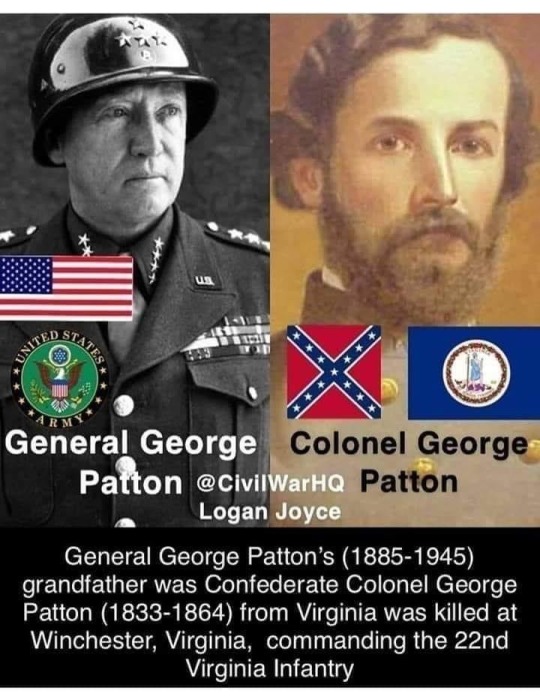

#general patton#theodore roosevelt#southerners#civil war#confederate#states rights#history#robert e lee#gravestones#confederacy#georgia#alabama#rebel#reconciliation#reconstruction#virginia
23 notes
·
View notes
Text

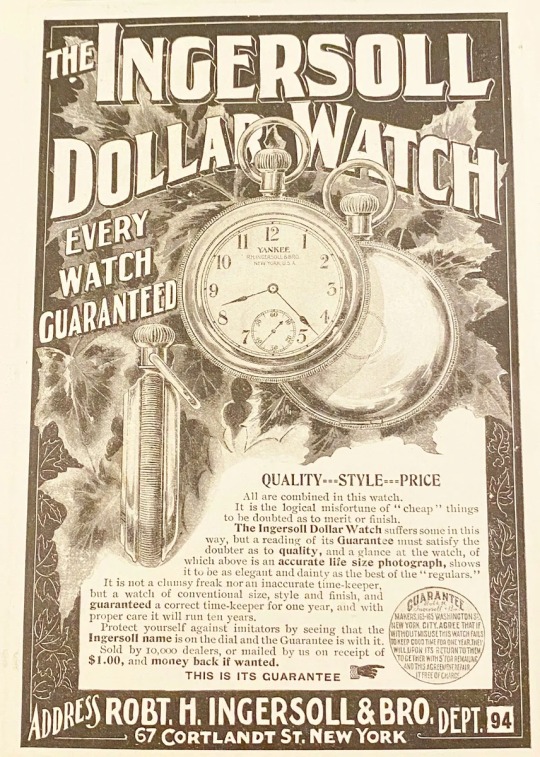
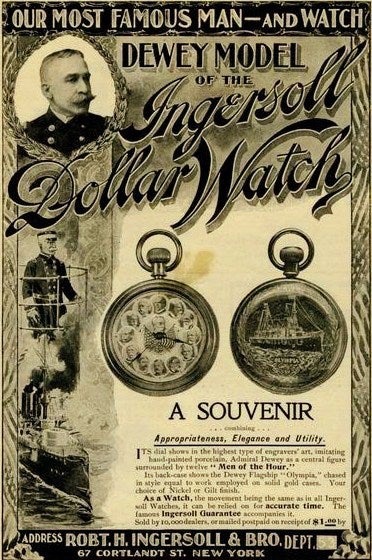
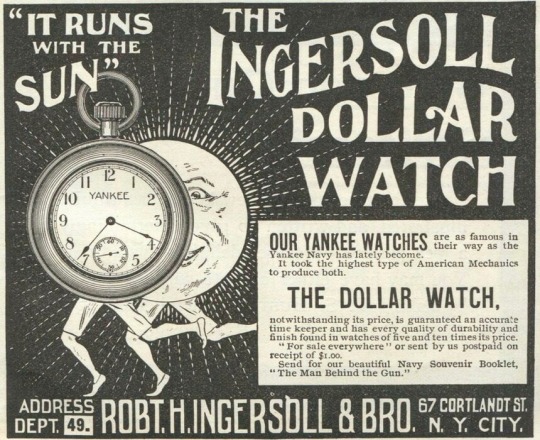

🇺🇲 In 1892 Robert Hawley and Charles Henry Ingersoll laid the foundation for The Ingersoll Watch Company. Born out of a humble mail order business in New York City in 1882, the company initially dealt in low-cost items like rubber stamps. However, their journey was destined for greater horizons.
⏱️ In 1896, Ingersoll revolutionized the watch industry by introducing the first-ever dollar watch – the "Yankee." Priced at a mere $1, it became an instant sensation, marking a significant milestone as the most affordable timepiece of its time. By 1899, an astonishing 8,000 watches were churned out daily, fueling the brand's exponential growth.
📊 Вy 1910, Ingersoll had become a household name, with over 10,000 dealers worldwide carrying their iconic timepieces. The dollar watch became synonymous with accessibility, democratizing timekeeping for people from all walks of life.
💰 Ingersoll's commitment to affordability and quality resonated with millions, with nearly 40 million dollar watches sold within two decades. Their impact was so profound that even president Theodore Roosevelt, during his African expedition, was recognized as "the man from the country where Ingersoll was produced."
💯 Ingersoll's legacy transcended mere timepieces; it became a cultural phenomenon. Their famous tagline, "The watch that made the dollar famous!" echoed across generations, cementing their place in horological history.
#TimeTrek#watch#clock#The Ingersoll Watch Company#ingersoll#yankee#dollar watch#retro#retro aesthetic#vintage#theodore roosevelt#president#brands#company#business#history#Robert Hawley#Charles Henry Ingersoll#new york#virginia#time#early 1900s#1890s#legendary#old watches#old technology#historical#made in usa#american watches#made in america
5 notes
·
View notes
Photo

The Triborough (now the Robert F. Kennedy) Bridge opened on July 11, 1936. The span, which links Manhattan, the Bronx, and Queens, was built at a cost of about $50 million (over a billion in 2022 dollars). It was the most expensive public works project of the New Deal, surpassing even that of the Hoover Dam.
The photos above show the distinguished guests at the dedication: Mayor La Guardia (seated, left), New York Governor Herbert Lehman (seated to the mayor’s left), President Roosevelt (standing), and, in the picture on the right, not-quite-ten year old Anthony Benedetto of Astoria. The young boy, who later changed his name to Tony Bennett, marched across the bridge with the mayor, singing “Marching Along Together.” He was rewarded with a pat on the head by the mayor.
Below, the bridge as it looked in the 1950s.
Photo top left: Bettmann Archives/Getty Images. Top right: Tony Bennett/Twitter. Below: Hulton Archive/Getty Images
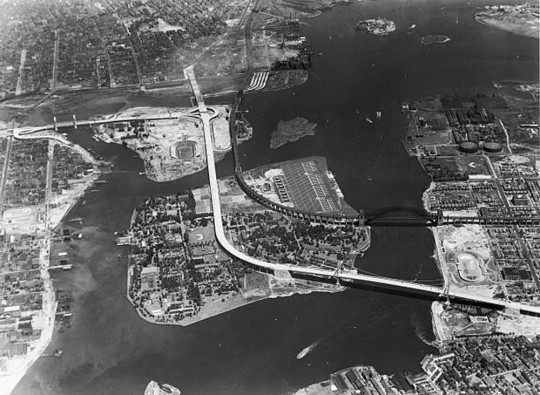
#New York#NYC#vintage New York#1930s#Triborough Bridge#Tony Bennett#Triboro Bridge#Robert F. Kennedy Bridge#Fiorello LaGuardia#Herbert Lehman#FDR#Franklin D. Roosevelt
74 notes
·
View notes
Text
youtube
Hooked On Your Love - Roosevelt Roberts (I Bet You I Win / Hooked On Your Love, 197?)
#Soul#Soul Music#Soul Music Songs#Music#Music Songs#Roosevelt Roberts#Hooked On Your Love#R & R#197?#Youtube
4 notes
·
View notes
Text
Robert Oppenheimer on the death of Franklin Roosevelt.
Richard Rhodes The Making of the Atomic Bomb.
5 notes
·
View notes
Note
LBJ shared his initials with Lady Bird and his daughters and I’m curious if it is known if when it came to naming their daughters, if it was an accident or on purpose to give their daughters their initials LBJ. ??
Oh, it was very much on purpose! He even named one of his dogs "Little Beagle Johnson". The fact that he and Lady Bird shared the LBJ initials was more of a coincidence: Lady Bird's actual first name was "Claudia", but she was given the nickname "Lady Bird" as a baby.
From early on in his political career, Lyndon Johnson worked to make sure he was instantly recognizable by his initials much like FDR. LBJ revered Franklin D. Roosevelt and FDR (who was impressed by the young Congressman from Texas's ambition, energy, and obvious political skills and became a mentor to Johnson before FDR's death) was someone that LBJ sought to emulate in many, many ways. Johnson, like Roosevelt, understood the power of good branding, so he actively sought to be known by his initials. As Robert Caro writes about then-Congressman Johnson in The Passage of Power:
"Instructing [aide Horace] Busby to refer to him in press releases as 'LBJ,' he explained: 'FDR-LBJ, FDR-LBJ. Do you get it? What I want is for them to start thinking of me in terms of initials.' It was only Presidents whom headline writers and the American people referred to by their initials; 'he was just so determined that someday he would be known as LBJ,' Busby recalls."
(By the way, throughout his long political career, Richard Nixon tried even harder to get people to refer to him as "RN". He desperately wanted to be in that same group as TR, FDR, JFK, and LBJ when it came to being recognized simply by his initials. In notes and memos, he'd refer to himself as "RN" and even included it in the title of his autobiography, "RN: The Memoirs of Richard Nixon". Obviously, he was significantly less successful at reaching the getting-referred-to-simply-by-his-initials-level.)
#Presidents#Lyndon B. Johnson#LBJ#President Johnson#History#Robert A. Caro#The Passage of Power#Presidential Nicknames#TR#FDR#JFK#Franklin D. Roosevelt#RN#Richard Nixon#President Nixon#Politics#Presidential Politics
24 notes
·
View notes
Text





Joseph P. Kennedy, Sr., and Rose Fitzgerald Kennedy pose with their children and family friends, James and Betsey Roosevelt, outside the Kennedy family home in Palm Beach, Florida, on Easter Sunday, 1934.
#Joseph P. Kennedy Sr#Rose Kennedy#Rosemary Kennedy#Eunice Kennedy Shriver#Patricia Kennedy Lawford#Jean Kennedy Smith#Robert F. Kennedy#Edward M. Kennedy#James Roosevelt#Betsey Cushing Roosevelt#Easter#Easter Sunday
4 notes
·
View notes
Text
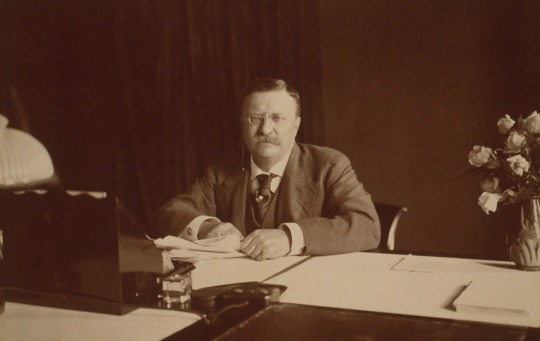
Here in America we the people have a continent on which to work out our destiny, and our faith is great that our men and women are fit to face the mighty days. Nowhere else in all the world is there such a chance for the triumph on a gigantic scale of the great cause of Democratic and popular government. If we fail, the failure will be lamentable, and our heads will be bowed with shame; for not only shall we fail for ourselves, but our failure will wreck the fond desires of all throughout the world who look toward us with the fond hope that here in this great Republic it shall be proved from ocean to ocean that the people can rule themselves, and thus ruling can gain liberty for and do justice both to themselves and to others. We who stand for the cause of the uplift of humanity and the betterment of mankind are pledged to eternal war against wrong whether by the few or by the many, by a plutocracy or by a mob. We believe that this country will not be a permanently good place for any of us to live in unless we make it a reasonably good place for all of us to live in. The sons of all of us will pay in the future if we of the present do not do justice to all in the present. Our cause is the cause of justice for all in the interest of all.
—Theodore Roosevelt, Address to the Republican National Convention, Chicago, IL, June 17, 1912.
[Robert Scott Horton]
#Theodore Roosevelt#RNC#Robert Scott Horton#quotes#Deomcratic Government#justice for all in the interest of all
9 notes
·
View notes